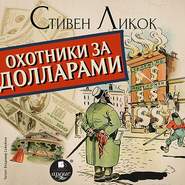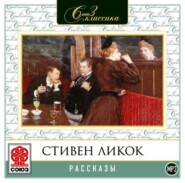По всем вопросам обращайтесь на: info@litportal.ru
(©) 2003-2025.
✖
The Hohenzollerns in America
Автор
Год написания книги
2019
Настройки чтения
Размер шрифта
Высота строк
Поля
Mr. Spugg told this with no false boasting or bravado, eating his celery as he spoke of it. Here was a man who had nearly had his chauffeur's wings blown off and yet he never moved a muscle. I began to realize the kind of resolute stuff that the man was made of.
A few days later bad news came to the club.
"Have you heard the bad news about Spugg?" someone asked.
"No, what?"
"His chauffeur's been gassed."
"How is he taking it?"
"Fine. He's sending off his gardener to take the chauffeur's place."
So that was Mr. Spugg's answer to the Germans.
We lunched together that day.
"Yes," he said, "Henry's gassed. How it happened I don't know. He must have come down out of the air. I told him I wanted him in the air. But let it pass. It's done now."
"And you're sending your gardener?"
"I am," said Spugg. "He's gone already. I called him in from the garden yesterday. I said, 'William, Henry's been gassed. Our first duty is to keep up our man power at the front. You must leave to-night.'"
"What are you putting William into?" I asked
"Infantry. He'll do best in the trenches,—digs well and is a very fair shot. Anyway I want him to see all the fighting that's going. If the Germans want give and take in this business they can have it. They'll soon see who can stand it best. I told William when he left. I said, 'William, we've got to show these fellows that man for man we're a match for them.' That's the way I look at it, man for man."
I watched Mr. Spugg's massive face as he went on with his meal. Not a nerve of it moved. If he felt any fear, at least he showed no trace of it.
After that I got war news from him at intervals, in little scraps, as I happened to meet him. "The war looks bad," I said to him one day as I chanced upon him getting into his motor. "This submarine business is pretty serious."
"It is," he said, "William was torpedoed yesterday."
Then he got into his car and drove away, as quietly as if nothing had happened.
A little later that day I heard him talking about it in the club. "Yes," he was saying, "a submarine. It torpedoed William,—my gardener. I have both a chauffeur and a gardener at the war. William was picked up on a raft. He's in pretty bad shape. My son Alfred had a cable from him that he's coming home. We've both telegraphed him to stick it out."
The news was the chief topic in the club that day. "Spugg's gardener has been torpedoed," they said, "but Spugg refuses to have him quit and come home." "Well done, Spugg," said everybody.
After that we had news from time to time about both
William and Henry.
"Henry's out of the hospital," said Spugg. "I hope to have him back in France in a few days. William's in bad shape still. I had a London surgeon go and look at him. I told him not to mind the expense but to get William fixed up right away. It seems that one arm is more or less paralysed. I've wired back to him not to hesitate. They say William's blood is still too thin for the operation. I've cabled to them to take some of Henry's. I hate to do it, but this is no time to stick at anything."
A little later William and Henry were reported both back in France. This was at the very moment of the great offensive. But Spugg went about his daily business unmoved. Then came the worst news of all. "William and Henry," he said to me, "are both missing. I don't know where the devil they are."
"Missing?" I repeated.
"Both of them. The Germans have caught them both. I suppose I shan't have either of them back now till the war is all over."
He gave a slight sigh,—the only sign of complaint that ever I had heard come from him.
But the next day we learned what was Spugg's answer to the German's capture of William and Henry.
"Have you heard what Spugg is doing?" the members of the club asked one another.
"What?"
"He's sending over Meadows, HIS OWN MAN!"
There was no need to comment on it. The cool courage of the thing spoke for itself. Meadows,—Spugg's own man,—his house valet, without whom he never travelled twenty miles!
"What else was there to do?" said Mr. Spugg when I asked him if it was true that Meadows was going. "I take no credit for sending Meadows nor, for the matter of that, for anything that Meadows may do over there. It was a simple matter of duty. My son and I had him into the dining room last night after dinner. 'Meadows,' we said, 'Henry and William are caught. Our man power at the front has got to be kept up. There's no one left but ourselves and you. There's no way out of it. You'll have to go.'"
"But how," I protested, "can you get along with Meadows, your valet, gone? You'll be lost!"
"We must do the best we can. We've talked it all over. My son will help me dress and I will help him. We can manage, no doubt."
So Meadows went.
After this Mr. Spugg, dressed as best he could manage it, and taking turns with his son in driving his own motor, was a pathetic but uncomplaining object.
Meadows meantime was reported as with the heavy artillery, doing well. "I hope nothing happens to Meadows," Spugg kept saying. "If it does, we're stuck. We can't go ourselves. We're too busy. We've talked it over and we've both decided that it's impossible to get away from the office,—not with business as brisk as it is now. We're busier than we've been in ten years and can't get off for a day. We may try to take a month off for the Adirondacks a little later but as for Europe, it's out of the question."
Meantime, one little bit of consolation came to help Mr. Spugg to bear the burden of the war. I found him in the lounge room of the club one afternoon among a group of men, exhibiting two medals that were being passed from hand to hand.
"Sent to me by the French government," he explained proudly. "They're for William and Henry. The motto means, 'For Conspicuous Courage"' (Mr. Spugg drew himself up with legitimate pride). "I shall keep one and let Alfred keep the other till they come back." Then he added, as an afterthought, "They may never come back."
From that day on, Mr. Spugg, with his French medal on his watch chain, was the most conspicuous figure in the club. He was pointed out as having done more than any other one man in the institution to keep the flag flying. But presently the limit of Mr. Spugg's efforts and sacrifices was reached. Even patriotism such as his must have some bounds.
On entering the club one afternoon I could hear his voice bawling vociferously in one of the telephone cabinets in the hall. "Hello, Washington," he was shouting. "Is that Washington? Long Distance, I want Washington."
Fifteen minutes later he came up to the sitting room, still flushed with indignation and excitement. "That's the limit," he said, "the absolute limit!"
"What's the matter?" I asked.
"They drafted my son Alfred," he answered.
"Just imagine it! When we're so busy in the office that we're getting down there at half past eight in the morning! Drafted Alfred! 'Great Caesar' I said to them! 'Look here! You've had my chauffeur and he's gassed, and you've had my gardener and he's torpedoed and they're both prisoners, and last month I sent you my own man! That,' I said, 'is about the limit.'"
"What did they say," I asked.
"Oh, it's all right. They've fixed it all up and they've apologized as well. Alfred won't go, of course, but it makes one realise that you can carry a thing too far. Why, they'd be taking me next!"
"Oh, surely not!" I said.
3.—If Germany Had Won














